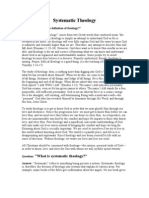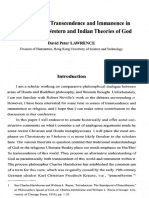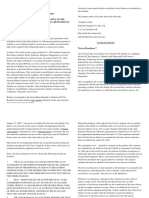0 ratings0% found this document useful (0 votes)
60 viewsWhat Is Theology
What Is Theology
Uploaded by
Jose MendozaTheology seeks to answer life's fundamental questions about identity, purpose, and the existence of evil through a critical examination of faith and divine revelation from the perspective of belief in God. It uses systematic investigation and various methods to understand teachings from the Bible, traditions, and doctrines in order to articulate Christian concepts of God, Christ, and the Church. Theological study also examines how faith informs believers' actions in working for social justice and liberating the oppressed from sins and structures that destroy human dignity.
Copyright:
© All Rights Reserved
Available Formats
Download as PDF, TXT or read online from Scribd
What Is Theology
What Is Theology
Uploaded by
Jose Mendoza0 ratings0% found this document useful (0 votes)
60 views1 pageTheology seeks to answer life's fundamental questions about identity, purpose, and the existence of evil through a critical examination of faith and divine revelation from the perspective of belief in God. It uses systematic investigation and various methods to understand teachings from the Bible, traditions, and doctrines in order to articulate Christian concepts of God, Christ, and the Church. Theological study also examines how faith informs believers' actions in working for social justice and liberating the oppressed from sins and structures that destroy human dignity.
Original Description:
TH 121
Original Title
What is Theology
Copyright
© © All Rights Reserved
Available Formats
PDF, TXT or read online from Scribd
Share this document
Did you find this document useful?
Is this content inappropriate?
Theology seeks to answer life's fundamental questions about identity, purpose, and the existence of evil through a critical examination of faith and divine revelation from the perspective of belief in God. It uses systematic investigation and various methods to understand teachings from the Bible, traditions, and doctrines in order to articulate Christian concepts of God, Christ, and the Church. Theological study also examines how faith informs believers' actions in working for social justice and liberating the oppressed from sins and structures that destroy human dignity.
Copyright:
© All Rights Reserved
Available Formats
Download as PDF, TXT or read online from Scribd
Download as pdf or txt
0 ratings0% found this document useful (0 votes)
60 views1 pageWhat Is Theology
What Is Theology
Uploaded by
Jose MendozaTheology seeks to answer life's fundamental questions about identity, purpose, and the existence of evil through a critical examination of faith and divine revelation from the perspective of belief in God. It uses systematic investigation and various methods to understand teachings from the Bible, traditions, and doctrines in order to articulate Christian concepts of God, Christ, and the Church. Theological study also examines how faith informs believers' actions in working for social justice and liberating the oppressed from sins and structures that destroy human dignity.
Copyright:
© All Rights Reserved
Available Formats
Download as PDF, TXT or read online from Scribd
Download as pdf or txt
You are on page 1of 1
What is theology?
Reflections by Fr. Randy Flores, SVD
How do I find God? you ask. I do not know how, but I do know where---in my fellow man. -Elie Wiesel
For many students, theology is an added burden, a boring subject, full of lectures and paper
works, memorizing biblical passages, and as one student quipped, deals with transcendental and
other-worldly matters. But beneath all these impressions, theology is concerned with the
fundamental questions which pervade human life: Who am I? Where have I come from and where
am I going? Why is there evil? What is there after this life?
These are the questions which we find in the sacred writings of Israel, as also in the Veda and
the Avesta; we find them in the writings of Confucius and Lao-Tze, and in the tragedies of Euripides
and Sophocles, as they do in the philosophical writings of Plato and Aristotle. They are questions
which have their common source in the quest for meaning which have their common source in the
quest for meaning which has always compelled the human heart. In fact, the answer given to these
questions decides the direction which people seek to give their lives. (By John Paul
II, in Fides et Ratio)
The desire to know is embedded in the human heart. The Old Testament concept of heart, is
not only the seat of emotion but also of thinking. The human heart is restless until it discovers the
answers to lifes fundamental questions. This innate desire of the human heart, as illustrated in the
Book of Job, is like a miner looking for gold (Job 28). This human search for answers is ultimately a
quest for wisdom: But whence can wisdom be obtained, and where is the place of understanding
(Job 28:12)?
Philosophy is directly concerned with asking the question of lifes meaning and attempting to
draw answers to it. In fact, term philosophy in Greek means love of wisdom. Philosophy begins
when the human being first asked the questions about the reason for things and their purpose.
Theology, on the other hand, seeks to find answers from the point of view of faith in God, the
God who revealed himself in Jesus of Nazareth. The words of the Book of Proverbs are significant:
The human mind plans the way, but the Lord directs the steps (16:9). Theology presupposes
faith. It is faith in God that compels the human being to search for the truth about him. St. Anselm
of Canterbury spoke of theology as faith seeking understanding.
Theology then is critical reflection of faith. It is critical not in the sense of finding faults but in
the sense of systematic and scientific investigation of the faith that we profess. The great Jesuit
theologian Karl Rahner defined theology as the conscious and methodological explanation and
explication of the divine revelation received and grasped in faith (Encyclopedia of Theology,
1975). Thus, theology can be called the science of faith. Its object of study is divine revelation,
that is, Gods self-communication in Jesus the Christ. Theology seeks to make sense and express in
an intelligible manner the meaning of God revealing himself in Jesus Christ who is the core of
Christian faith.
As a science that investigates, theology proceeds in a systematic way. Theology has a
number of different specialties and uses many different methods in its task of critically examining
the faith. Some specialties investigate the sources of Christian faith like the bible, the Church
traditions and its teachings. Some articulate the Christian understanding of God, Christ, Church,
human experience and action, sacraments, and so on. Others examine the Christian way of life,
conduct, prayer and worship and action in the world.
Theological investigation is not only concerned with examining the content of faith but also
the actions of believers in particular, actions in behalf of the weak, the poor, and the oppressed of
our society. Theology seeks to bring into the consciousness of the believers the unjust social
structures that continue to make the poor poorer, the rich richer, the weak weaker, and the
powerful more powerful. Theology in this aspect is a struggle for justice. It is faith seeking social
justice. This theology is called, liberation theology because it seeks to liberate the human being
from all forms of structures that enslave and destroy the persons human dignity: sin, poverty,
discrimination, greed, etc. In the Philippines where majority live below poverty line, such kind of
theology is indeed relevant. Studying theology is not merely critical reflection of faith but also of
understanding praxis (action) that leads to human liberation.
You might also like
- A Transcendental Argument For The Orthodox Christian ParadigmDocument14 pagesA Transcendental Argument For The Orthodox Christian ParadigmJoão Pedro100% (2)
- The Two Faces of Christianity: A Psychological AnalysisFrom EverandThe Two Faces of Christianity: A Psychological AnalysisNo ratings yet
- Introduction To Moral Theology-Thy1Document7 pagesIntroduction To Moral Theology-Thy1EFG100% (1)
- Contemplative Science: Where Buddhism and Neuroscience ConvergeFrom EverandContemplative Science: Where Buddhism and Neuroscience ConvergeNo ratings yet
- An Introduction to Theological Anthropology: Humans, Both Creaturely and DivineFrom EverandAn Introduction to Theological Anthropology: Humans, Both Creaturely and DivineRating: 5 out of 5 stars5/5 (2)
- The Senses of Scripture: by Pauline A. Viviano, PHDDocument4 pagesThe Senses of Scripture: by Pauline A. Viviano, PHDJose MendozaNo ratings yet
- Electronics Today 1986 02 OCR Page 0049Document1 pageElectronics Today 1986 02 OCR Page 0049mikesoupNo ratings yet
- 5V From Portable Wind TurbineDocument7 pages5V From Portable Wind TurbineAl-hafiz JamilNo ratings yet
- The Path of Reason in Search of TruthDocument179 pagesThe Path of Reason in Search of TruthOmegaMan81100% (1)
- What Similarities One Might Find When Both Hellenistic Thought and JohannineDocument6 pagesWhat Similarities One Might Find When Both Hellenistic Thought and JohannineMS DawngaNo ratings yet
- Philosophy of Jesus ChristDocument5 pagesPhilosophy of Jesus ChristToning-Rey AlbzNo ratings yet
- Ageless Wisdom CompleteDocument91 pagesAgeless Wisdom Completenavigator1977No ratings yet
- The Eastern Orthodox Theology and Buddhism - Tatsuya YamazakiDocument10 pagesThe Eastern Orthodox Theology and Buddhism - Tatsuya YamazakiRev BalanNo ratings yet
- Exhibition of Revealed Truth, The Science of Christian Faith and Life. (Webster'sDocument4 pagesExhibition of Revealed Truth, The Science of Christian Faith and Life. (Webster'sELMSSNo ratings yet
- Christian Approach To Discerning SpiritualitiesDocument20 pagesChristian Approach To Discerning Spiritualities300rNo ratings yet
- John E ThielDocument3 pagesJohn E ThielbenedictusNo ratings yet
- TheologyDocument9 pagesTheologysaw wellingtonboyNo ratings yet
- Theosophy Annie BesantDocument54 pagesTheosophy Annie Besantoos777No ratings yet
- Turning East - Contemporary Philosophers and The Ancient Christian Faith (Rico Vitz)Document3 pagesTurning East - Contemporary Philosophers and The Ancient Christian Faith (Rico Vitz)vesteroseNo ratings yet
- Definition and Contours of TheologyDocument11 pagesDefinition and Contours of Theologydanielkissolo6No ratings yet
- S.N Balagangadhara Notes - On - NormativityDocument14 pagesS.N Balagangadhara Notes - On - NormativitySatishSharmaNo ratings yet
- The Light of LifeDocument31 pagesThe Light of LifepetmixNo ratings yet
- Book Edcoll 9789004391741 BP000025-previewDocument2 pagesBook Edcoll 9789004391741 BP000025-previewAthanasius Al HassanNo ratings yet
- Branches of TheologyDocument3 pagesBranches of TheologyMamang Sorbetero100% (5)
- Re-imagining African Christologies: Conversing with the Interpretations and Appropriations of Jesus in Contemporary African ChristianityFrom EverandRe-imagining African Christologies: Conversing with the Interpretations and Appropriations of Jesus in Contemporary African ChristianityRating: 5 out of 5 stars5/5 (1)
- Introduction To Moral TheologyDocument8 pagesIntroduction To Moral TheologyDee GeeNo ratings yet
- Fides Et RatioDocument94 pagesFides Et RatiorichliviNo ratings yet
- OsipovDocument186 pagesOsipovFrJohn SomersNo ratings yet
- Unit 2Document10 pagesUnit 2tripathisoumya532No ratings yet
- Systematic TheologyDocument7 pagesSystematic Theologyotisburns50% (2)
- The Logos DoctrineDocument4 pagesThe Logos DoctrineDallasWolfNo ratings yet
- DUCTION TO THE PHILOSOPHY OF THE HUMAN PERSON HANDOUT 2QDocument25 pagesDUCTION TO THE PHILOSOPHY OF THE HUMAN PERSON HANDOUT 2QMontefalc JayNo ratings yet
- Tatsuya Yamazaki - The Eastern Orthodox Theology and Buddhism. Deification and NirvanaDocument10 pagesTatsuya Yamazaki - The Eastern Orthodox Theology and Buddhism. Deification and NirvanaTREND_7425No ratings yet
- A Forgot Ten Method of Theology InsightsDocument19 pagesA Forgot Ten Method of Theology InsightsCristian IonitaNo ratings yet
- Term Paper On EschatologyDocument6 pagesTerm Paper On Eschatologyafdtovmhb100% (1)
- Faith and ReasonDocument64 pagesFaith and ReasonCopila AlexandraNo ratings yet
- Contexual Theologies AsaDocument2 pagesContexual Theologies Asachristinaparoon3No ratings yet
- Person in Patristic and Medieval Christianity ALT ARTICOLDocument25 pagesPerson in Patristic and Medieval Christianity ALT ARTICOLadriandumitrascu1986No ratings yet
- Handout 01 - Mythic HorizonsDocument10 pagesHandout 01 - Mythic HorizonsJules DrilonNo ratings yet
- ¿Qué Es El Alma?Document27 pages¿Qué Es El Alma?Bryan Leonardo TipantaNo ratings yet
- In the Twilight with God: A Critique of Religion in the Light of Man’s Glassy EssenceFrom EverandIn the Twilight with God: A Critique of Religion in the Light of Man’s Glassy EssenceNo ratings yet
- The Dialectic of Transcendence and Immanence inDocument17 pagesThe Dialectic of Transcendence and Immanence inmitchel_faria7240No ratings yet
- What Is MetaphysicsDocument4 pagesWhat Is MetaphysicsJonathanNo ratings yet
- SOPHIA Paper PrintDocument14 pagesSOPHIA Paper PrintJoão PedroNo ratings yet
- Metaphysics, Epistemology, and EthicsDocument3 pagesMetaphysics, Epistemology, and EthicsScott MatsonNo ratings yet
- Body, Mind, Soul and SpiritDocument74 pagesBody, Mind, Soul and SpiritFábio LamimNo ratings yet
- Spiritual Theology or Spirituality StudiDocument7 pagesSpiritual Theology or Spirituality StudikingofglorynagercoillNo ratings yet
- The Path of Reason in Search of The Truth - A.I. OsipovDocument179 pagesThe Path of Reason in Search of The Truth - A.I. OsipovikonographicsNo ratings yet
- Philo ReflectionDocument4 pagesPhilo Reflectiontanjames86No ratings yet
- Lecture Notes, Christology 8Document8 pagesLecture Notes, Christology 8Nancy AidooNo ratings yet
- EddieDocument3 pagesEddieCharles LowieNo ratings yet
- Soul-Less - Christianity and The Buddhist Emperical Self - Burns - BCS - 23 - 2003Document15 pagesSoul-Less - Christianity and The Buddhist Emperical Self - Burns - BCS - 23 - 2003flatline0467839No ratings yet
- Intro To World Religion 1stDocument198 pagesIntro To World Religion 1stEduard MoralesNo ratings yet
- Christian EthicsDocument9 pagesChristian Ethicsogayonselle08No ratings yet
- ApologeticsDocument112 pagesApologeticsJandreadisNo ratings yet
- Theosophical Society - Steady Progression: CultsDocument3 pagesTheosophical Society - Steady Progression: CultsServant Of TruthNo ratings yet
- Vino v. PeopleDocument5 pagesVino v. PeopleJose MendozaNo ratings yet
- Persons CasesDocument20 pagesPersons CasesJose MendozaNo ratings yet
- Basketball CaseDocument1 pageBasketball CaseJose MendozaNo ratings yet
- LVN Pictures Case DigestDocument2 pagesLVN Pictures Case DigestJose MendozaNo ratings yet
- ABS-CBN Vs NAZARENO Case DigestDocument2 pagesABS-CBN Vs NAZARENO Case DigestJose MendozaNo ratings yet
- Television, PetitionerDocument13 pagesTelevision, PetitionerJose MendozaNo ratings yet
- 524 US v. CausbyDocument11 pages524 US v. CausbyJose MendozaNo ratings yet
- Ynares-Santiago, - Versus - Austria-MartinezDocument25 pagesYnares-Santiago, - Versus - Austria-MartinezJose MendozaNo ratings yet
- Chapter One: TheologyDocument13 pagesChapter One: TheologyJose MendozaNo ratings yet
- What's Education For OutlineDocument1 pageWhat's Education For OutlineJose MendozaNo ratings yet
- Chapter 5: Note-TakingDocument2 pagesChapter 5: Note-TakingJose MendozaNo ratings yet
- Mla CitationDocument1 pageMla CitationJose MendozaNo ratings yet
- Total Station: Parts, Functions and Setting-Up ProceduresDocument15 pagesTotal Station: Parts, Functions and Setting-Up ProceduresKhiel Yumul100% (1)
- Petroleum Engineering Handbook Vol 4 - Hal 9Document1 pagePetroleum Engineering Handbook Vol 4 - Hal 9Dawud PrionggodoNo ratings yet
- Lesson 1 Math 13-1Document53 pagesLesson 1 Math 13-1akladffja100% (1)
- HermesTRX Tetra MotorolaDocument2 pagesHermesTRX Tetra Motorolarikl0No ratings yet
- All Weeks (Latest)Document10 pagesAll Weeks (Latest)Hairul AnuarNo ratings yet
- General Knowledge Today Magazine India March PDFDocument188 pagesGeneral Knowledge Today Magazine India March PDFsanjNo ratings yet
- Biomechanics of The SpineDocument18 pagesBiomechanics of The SpineSudheer Jayaram100% (1)
- 06 - Universal Correction Through Navajyothisri Karunakara GuruDocument2 pages06 - Universal Correction Through Navajyothisri Karunakara GurusanthigiNo ratings yet
- 1. A Triumph of Surgery - QADocument5 pages1. A Triumph of Surgery - QAmovieditngNo ratings yet
- Cover PageDocument4 pagesCover Pageg tsNo ratings yet
- Circular Motion Review Key PDFDocument21 pagesCircular Motion Review Key PDFKen HueyNo ratings yet
- PVAC-E CatalogueDocument19 pagesPVAC-E CatalogueUmer FarNo ratings yet
- Energies: Thermal Assessment of Power Cables and Impacts On Cable Current Rating: An OverviewDocument38 pagesEnergies: Thermal Assessment of Power Cables and Impacts On Cable Current Rating: An OverviewPratikNo ratings yet
- THE BOOK OF THE COURSES OF THE HEAVENLY LUMINARIES Henoch 72Document8 pagesTHE BOOK OF THE COURSES OF THE HEAVENLY LUMINARIES Henoch 72Ace Orense Cupid Uranus Ace Sphinx Galzu Acetr444 son of Multiverses Chaos Gaeia Eros ACETR444100% (2)
- Bài Tập Tổng Hợp Cho Hsg (Tặng Kèm- No Key)Document58 pagesBài Tập Tổng Hợp Cho Hsg (Tặng Kèm- No Key)nguyenlien.c3doicanNo ratings yet
- Micro-Tensile Bond Strengths To Sclerotic Dentin Using A Self-Etching and A Total-Etching TechniqueDocument11 pagesMicro-Tensile Bond Strengths To Sclerotic Dentin Using A Self-Etching and A Total-Etching TechniqueValerio GriecoNo ratings yet
- Chapter10 Flight Control SystemDocument11 pagesChapter10 Flight Control SystemmsrchandNo ratings yet
- Biji MantraDocument16 pagesBiji MantraK SelvakumarNo ratings yet
- Novedades Del Género Tillandsia (Bromeliaceae, Tillandsioideae) para UruguayDocument13 pagesNovedades Del Género Tillandsia (Bromeliaceae, Tillandsioideae) para Uruguayginiimartin04No ratings yet
- Polycoat RbeDocument2 pagesPolycoat RbeganmosesNo ratings yet
- Sword Art Online Alternative - Gun Gale Online - Volume 01 - Squad JamDocument431 pagesSword Art Online Alternative - Gun Gale Online - Volume 01 - Squad JamasdfsdjhNo ratings yet
- Zengest OilDocument1 pageZengest OilMarianNo ratings yet
- Biology ProjectDocument24 pagesBiology Projectprince gupta50% (2)
- Nyaya PhilosophyDocument17 pagesNyaya PhilosophyRONI NATHNo ratings yet
- Good Laboratories Practice (GLP) in Pharmaceuticals - PharmaguidelineDocument2 pagesGood Laboratories Practice (GLP) in Pharmaceuticals - PharmaguidelineAhmed GasserNo ratings yet
- Barbados Tyre Garden Guide Part 2Document1 pageBarbados Tyre Garden Guide Part 2The Future CentreNo ratings yet
- Adsorption, Adsorbant and AdsorbateDocument6 pagesAdsorption, Adsorbant and AdsorbateVijay kumarNo ratings yet
- PDE677 Serrature RevolutionPRO ENDocument12 pagesPDE677 Serrature RevolutionPRO ENMarco PauloNo ratings yet






































































































